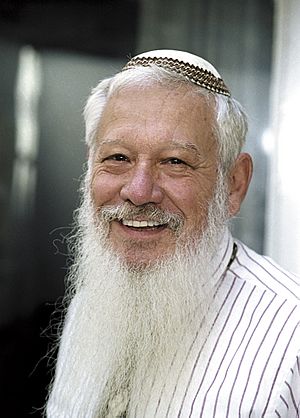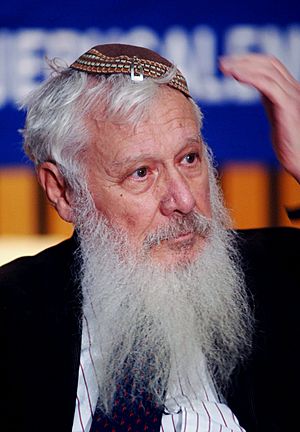Robert Aumann facts for kids
Quick facts for kids
Robert Aumann
ישראל אומן |
|
|---|---|

Aumann in 2015
|
|
| Born |
Robert John Aumann
8 June 1930 |
| Nationality | Israeli, American |
| Institution | Hebrew University of Jerusalem Stony Brook University |
| Field | Mathematical economics Game theory |
| Doctoral advisor |
George Whitehead, Jr. |
| Doctoral students |
David Schmeidler Sergiu Hart Abraham Neyman< Yair Tauman |
| Contributions | Aumann's agreement theorem Folk theorem Correlated equilibrium Anscombe-Aumann framework Integral of a correspondence |
| Awards | Nobel Memorial Prize in Economics Erwin Plein Nemmers Prize in Economics John von Neumann Theory Prize Harvey Prize in Science and Technology Israel Prize for Economical Research |
| Information at IDEAS / RePEc | |
Robert John Aumann (also known as Yisrael Aumann, born June 8, 1930) is a famous Israeli-American mathematician. He is a member of the United States National Academy of Sciences. He works as a professor at the Center for the Study of Rationality at the Hebrew University of Jerusalem. He also teaches at Stony Brook University, where he helped start the Center for Game Theory.
In 2005, Aumann won the Nobel Memorial Prize in Economic Sciences. He received this award for his important work on how people cooperate and deal with conflict. He used a special field of study called game theory to understand these situations. He shared the prize with Thomas Schelling.
Contents
Early Life and Education
Robert Aumann was born in Frankfurt am Main, Germany. In 1938, his family moved to the United States. They left just two weeks before a terrible event called the Kristallnacht pogrom. He went to a high school called the Rabbi Jacob Joseph School in New York City.
Aumann finished his studies at the City College of New York in 1950. He earned a Bachelor of Science (B.S.) degree in mathematics. He then continued his education at the Massachusetts Institute of Technology. He received his Master's degree (M.S.) in 1952. In 1955, he earned his Doctor of Philosophy (Ph.D.) in Mathematics. His Ph.D. research was about knot theory. His professor was George Whitehead, Jr..
Academic Career
In 1956, Robert Aumann joined the Mathematics department at the Hebrew University of Jerusalem. Since 1989, he has also been a visiting professor at Stony Brook University. He has taught at other universities too. These include the University of California, Berkeley, Stanford University, and Universite Catholique de Louvain.
Understanding Game Theory
Aumann's most important work is in game theory. This field studies how people make decisions when their choices affect others. He focused on "repeated games." These are situations where people face the same choices many times.
Aumann was the first to describe something called "correlated equilibrium" in game theory. This is a way to understand how players can make choices that are better for everyone. It is more flexible than another idea called "Nash equilibrium." He also helped explain "common knowledge." This is when everyone knows something, and everyone knows that everyone else knows it.
He also worked with another scientist, Lloyd Shapley. Together, they developed the "Aumann–Shapley value." Aumann is also known for "Aumann's agreement theorem." This idea suggests that if two people think logically and start with similar beliefs, they cannot disagree forever.
Game Theory and Ancient Texts
Aumann and Maschler used game theory to study old Jewish texts called the Talmud. They used game theory to solve a puzzle about dividing a husband's inheritance among his three wives. This puzzle had been difficult to understand for a long time. Their work on this topic was dedicated to Aumann's son, Shlomo. Shlomo was a soldier who died in the 1982 Lebanon War.
Aumann also guided several students who earned their Ph.D. degrees. Some of his students include David Schmeidler, Sergiu Hart, Abraham Neyman, and Yair Tauman.
Looking into Bible Codes
Robert Aumann, being both a religious person and a scientist, was interested in research about "Bible codes." This research claims to find hidden messages in the Bible. He supported some of this research, especially an experiment called the "Great Rabbis Experiment." This experiment was published in a science journal.
Aumann helped arrange for one of the researchers to give a talk about Bible codes. He also tried to get their paper published in another important science journal. However, that paper was not accepted.
Later, Aumann was part of a group that looked at other Bible code experiments. These new tests did not find evidence of the codes. After studying the topic for a long time, Aumann said that the idea of Bible codes seemed "improbable" to him. He explained that his own research did not prove the codes exist, but it also did not prove they don't. So, he went back to his original thought that they are unlikely.
Political Views
Robert Aumann has shared his thoughts on war and peace. Here are some of his ideas:
- War is not always illogical. We need to study it scientifically to understand it and hopefully stop it.
- When people play "repeated games," they think more about the future than just the present moment.
- Sometimes, simple ideas for peace can actually lead to war. On the other hand, having strong defenses or threats that everyone believes can sometimes prevent wars.
Aumann is part of a group called Professors for a Strong Israel. This group has certain political views. He did not agree with Israel's plan to leave Gaza in 2005. He believed it was wrong for the settlers in Gush Katif and a danger to Israel's safety.
He used an idea from game theory called the Blackmailer Paradox to explain his view. He argued that giving land to others might not be a good strategy. He felt that if one side makes very strong demands, the other side might feel forced to give in.
Because of his political views and how he used his research to support them, some people criticized the decision to give him the Nobel Prize. A petition to cancel his prize was signed by many academics.
In a speech, Aumann suggested that Israel might be in "deep trouble." He wondered if some religious groups who opposed the original Zionist movement might have been right. He believes that Zionism, which is the movement to support a Jewish homeland, needs a religious foundation to survive.
In 2008, Aumann joined a political party called Ahi. This party is part of the religious Zionist movement.
Personal Life
Robert Aumann married Esther Schlesinger in April 1955. They met in 1953 when Esther, who was from Israel, was visiting the United States. They had five children. Their oldest son, Shlomo, was a student and a soldier. He was killed in action during the 1982 Lebanon War. An institute that publishes old Jewish legal texts, called Machon Shlomo Aumann, was named after him.
Esther, Aumann's first wife, passed away in October 1998. In November 2005, Aumann married Esther's sister, Batya Cohn, who was also a widow.
Aumann is also a cousin of the famous writer and neurologist Oliver Sacks.
Honours and Awards
- 1974: Became an honorary member of the American Academy of Arts and Sciences.
- 1983: Received the Harvey Prize in Science and Technology.
- 1994: Awarded the Israel Prize for economics.
- 1998: Received the Erwin Plein Nemmers Prize in Economics.
- 2002: Won The EMET Prize in Economics.
- 2005: Shared the Nobel Memorial Prize in Economic Sciences with Thomas Schelling.
- 2006: Received the Yakir Yerushalayim (Worthy Citizen of Jerusalem) award from the city of Jerusalem.
See also
 In Spanish: Robert Aumann para niños
In Spanish: Robert Aumann para niños
- List of Israel Prize recipients
- List of Israeli Nobel laureates
- List of Jewish Nobel laureates
- List of economists
 | John T. Biggers |
 | Thomas Blackshear |
 | Mark Bradford |
 | Beverly Buchanan |


